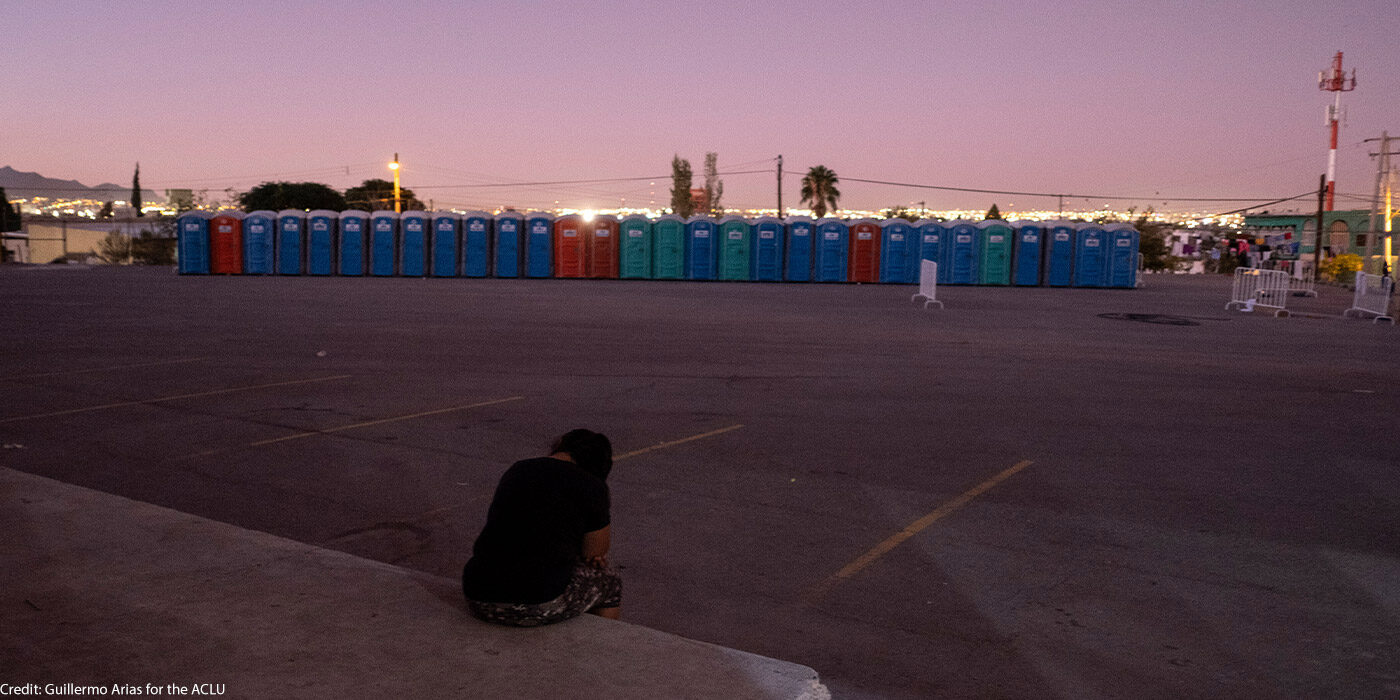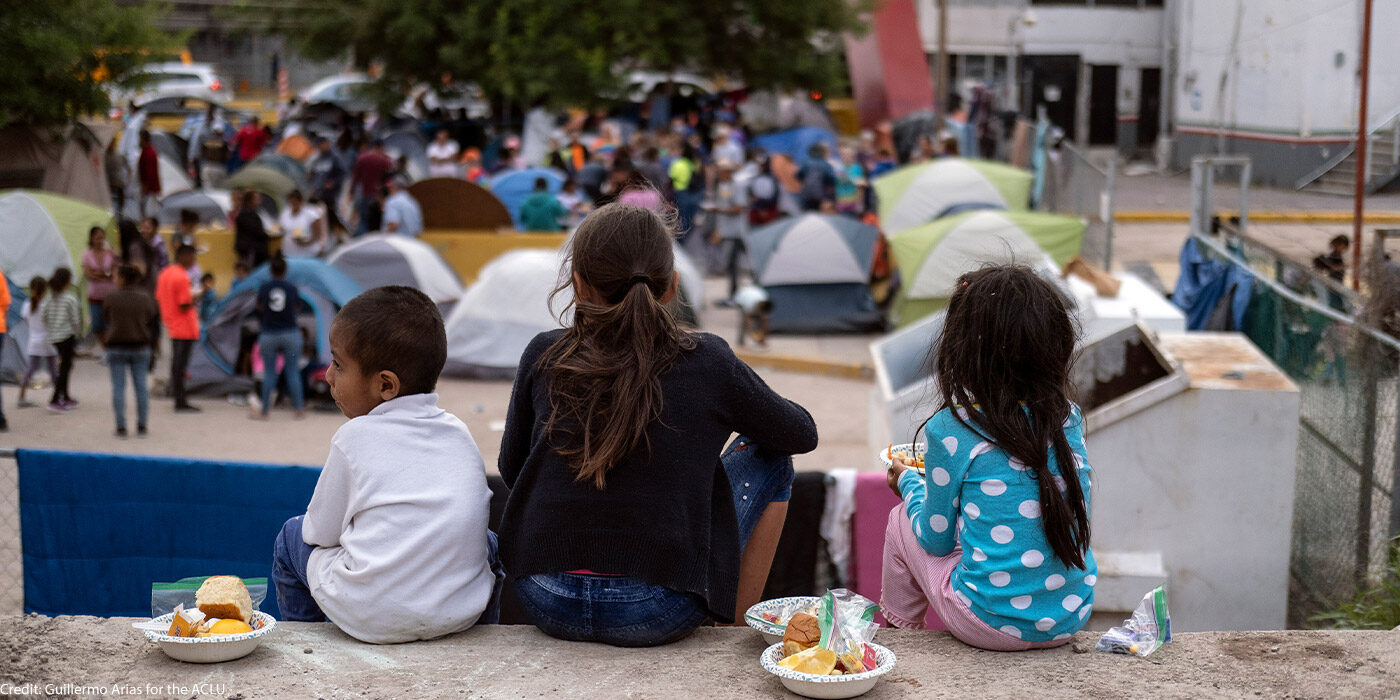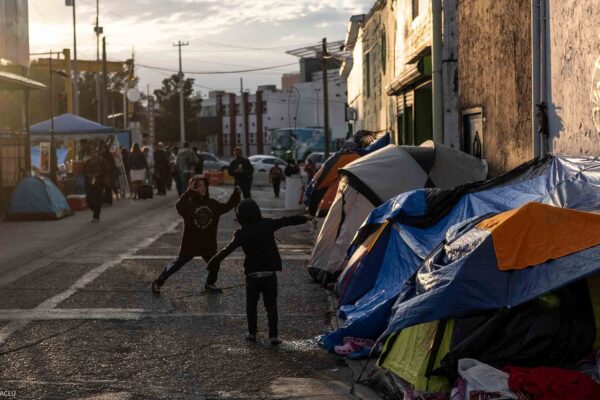Since the Trump Administration first unrolled its policy of forcing migrants to wait in Mexico for their asylum hearings, advocates have been warning that the practice places them in danger. Now, the global coronavirus outbreak is putting an exclamation point on those warnings and adding a new, frightening layer of risk into the lives of asylum seekers stuck in Northern Mexico.
On Monday, reports emerged of asylum seekers who were scheduled to appear in court in the U.S. instead being turned back from border checkpoints by Customs and Border Protection (CBP) officers. That evening, the Department of Homeland Security (DHS) announced that all hearings for asylum seekers returned to Mexico up to April 22nd would be rescheduled.
According to an attorney based in El Paso, Texas, those hearings are being pushed to late April or early May, although there is no guarantee that the outbreak will have abated by then.
Meanwhile, many asylum seekers have been stuck in dangerous border cities for months waiting for those hearings. Health workers say that now they are vulnerable to the COVID-19 pandemic in ways that would have been avoided if they had been admitted and released into the U.S. for their proceedings.
Under the “Migrant Protection Protocols” (MPP), around 60,000 people have been forced to wait in Mexico while their requests for protection in the U.S. are weighed by the courts. Over 17,000 of them are still waiting on upcoming hearings — more than 6,500 for at least six months.
Last Friday, the U.S. and Mexico announced they were closing the border to “non-essential” travel and the Centers for Disease Control released a public health order suspending “the introduction of certain persons” into the U.S. The order will likely be used to sharply curtail access to the asylum system for anyone who arrives at the border right now.

For those who were already returned to Mexico under the MPP — many of whom are fleeing political persecution, gang violence, and abuse at home — an uncertain future now looms.
For the past year, advocates have criticized the MPP as a cruel policy meant to deter people from seeking asylum in the U.S. by forcing them to stay in dangerous areas during a long, drawn-out legal process. Many asylum seekers who return to Mexico under the policy wind up in overcrowded migrant shelters or in some cases, sprawling tent camps near the border.
Thus far, no cases of COVID-19 have been reported among any asylum seekers in Mexico. But the numbers of people infected with the disease in states like California and Texas are growing, raising concerns in previous weeks that asylum seekers who attended their hearings could bring the virus back into Mexico with them after being exposed inside the U.S.
Linda Rivas, executive director of the El Paso-based legal services organization Las Americas, said last week a client of hers chose to skip a court date she’d been waiting on for months rather than risk entering the U.S.
“The idea of having to go back and forth and then going into the shelter space is just really scary,” said Rivas. “The cell phones that we have dedicated for our MPP clients are ringing off the hook. Lots of questions, lots of doubts.”
Tania Guerrero, an attorney with the Washington, D.C.-based Catholic Legal Immigration Network, says the federal migrant shelter in Ciudad Juarez has begun to implement precautionary measures, but she fears what might happen if an asylum seeker there contracts the disease.
“There’s no social distance,” she said. “Now at least people aren’t on the floor, they have bunk beds, but they’re all crammed into one huge room in a warehouse.”
Guerrero said the shelter is now requiring staff and volunteers to wear surgical masks as well as recording the temperature of its residents when they return to the facility:
“If you leave, you might not be able to come back. And that’s not just out of fear, it’s out of precaution.”

On the other end of the Texas border, in Matamoros, Mexico — where a tent camp with thousands of asylum seekers has sprung up — humanitarian relief workers say an outbreak of COVID-19 could be catastrophic.
Helen Perry, the director of Global Response Management (GRM), an aid organization that provides medical services to the camp’s residents, says she’s bracing for the arrival of the virus.
“The camp is close living quarters. Showers, kitchens, sinks, and bathrooms are all communal. They’re kind of crammed in there,” she said.
GRM is making plans to build a 20-bed field hospital with the capacity to do basic bloodwork and intravenous rehydration, which she hopes could keep moderate cases from becoming severe if there is an outbreak.
“People here are walking around moderately malnourished or chronically dehydrated, and 25 percent of them have underlying chronic health conditions like diabetes and hypertension,” she said. “We feel like we have to react and be able to offer care that could keep them from getting chronically ill and needing to be intubated.”
According to Perry, Matamoros has only ten total ventilators in the entire city. Tensions between residents of Matamoros and people living in the camp have spiked since anti-MPP protests temporarily shut down traffic at a major border checkpoints in January, and Perry worries about what could happen if someone in the camp contracts the virus.
“There is already stigma that exists against individuals in the camp,” she said.
The ACLU sued to end the MPP not long after it first went into effect in Tijuana, Mexico. On February 28th, the Ninth Circuit Court of Appeals ruled in favor of the ACLU in the suit, agreeing with a lower court that it should be blocked. But on March 11th, the Supreme Court stepped in and stayed the Ninth Circuit’s order, allowing the policy to remain in effect.
Now, because of that policy, asylum seekers in Northern Mexico who traveled to the U.S. hoping to find safety will have to face the COVID-19 outbreak in an environment that was already precarious, and which has now become even more unsafe.
If the disease becomes widespread in Northern Mexico, asylum seekers from Central America and elsewhere are unlikely to be at the front of the line for a health care system with limited resources. And with their legal process delayed by at least a month or more, there is no way to tell what the ultimate impact of the crisis will be on their efforts to find safety.
“We’re worried about them,” said Guerrero. “They’ve been in limbo for so long, you know?”
Ashoka Mukpo, Staff Reporter, ACLU

